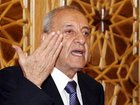Spotlight
The Presidency on Tuesday confirmed that President Michel Aoun, First Lady Nadia Aoun and ten of the president’s close associates have been vaccinated against Covid-19, amid controversy over the vaccination of 16 MPs who were accused of bypassing the country’s official inoculation platform that is aimed at ensuring a fair rollout of the vaccine.
The Presidency’s statement came shortly after al-Jadeed TV reported that “a medical team headed to the presidential palace on Friday, where they vaccinated the president, his wife and 16 members of his team.”
 Full Story
Full Story
The parliamentary committees on Tuesday approved a World Bank loan agreement worth $246 million and dedicated to supporting the country’s poorest and most vulnerable families and the Covid-19 response plan.
Speaking after the session, the head of the finance and budget committee MP Ibrahim Kanaan said “the agreement was approved, in principle, after taking the reservations of all parliamentary blocs and MPs into consideration.”
 Full Story
Full Story
Najat Rochdi, the Officer in Charge of the Office of the U.N. Special Coordinator for Lebanon and Resident and Humanitarian Coordinator for Lebanon, met Monday with Maronite Patriarch Beshara al-Rahi and discussed with him the latest developments in Lebanon, including the deepening socio-economic crisis and its impact on the Lebanese people, her office said on Tuesday.
"Ms. Rochdi listened to Patriarch Rahi's proposal and views on holding an international conference for Lebanon," the office said in a statement.
 Full Story
Full Story
The World Bank threatened Tuesday to suspend financing for coronavirus vaccines in Lebanon over what it said were suspected violations by lawmakers who were inoculated in parliament.
Such a move by the World Bank would have grave consequences as Lebanon struggles through severe financial and economic crises and is in desperate need of aid. The World Bank said last month it approved $34 million to help pay for vaccines for Lebanon that will inoculate over 2 million people. The vaccination campaign in the country began on Feb. 14 and Lebanon has so far received nearly 60,000 shots of Pfizer-BioNTech.
 Full Story
Full Story
Progressive Socialist Party leader Walid Jumblat has reiterated that the ammonium nitrates that exploded at Beirut port had been imported to be used in “striking Syrian cities and villages with aircraft-dropped barrel bombs.”
In an interview with LBCI TV, Jumblat added that the barrel bombs “replaced the chemical weapons, which in 2014 were seized from the Syrians following Barrack Obama’s agreement with Vladimir Putin.”
 Full Story
Full Story
Prominent political sides will seek to convince PM-designate Saad Hariri to accept a government of 22 or 24 ministers in which no single party would have a one-third-plus-one share, media reports said on Tuesday.
“The 18-seat government format has become a weak possibility,” al-Joumhouria newspaper quoted “credible sources” as saying.
 Full Story
Full Story
Parliament Speaker Nabih Berri has warned that “if the government is not formed by April at the latest, there will remain neither a country nor electricity.”
Berri voiced the remarks in a February 17 meeting with caretaker Energy Minister Raymond Ghajar according to a report published Tuesday by al-Akhbar newspaper.
 Full Story
Full Story
A Lebanese Forces parliamentary delegation on Monday handed U.N. Deputy Special Coordinator for Lebanon Najat Rochdi a petition demanding an international fact-finding mission into the disastrous Aug. 4 blast at Beirut port.
The petition is signed by the LF’s 15 lawmakers and addressed to U.N. Secretary General Antonio Guterres.
 Full Story
Full Story
A disastrous oil spill that has blackened most of Israel's shoreline has apparently affected Lebanon and deposits of tar have started washing up in the Lebanese south.
The management of the city of Tyre's coastal nature reserve, one of Lebanon's last remaining sandy beaches and an important nesting site for endangered Loggerhead and Green sea turtles, said the spill could endanger marine life and biodiversity in the area.
 Full Story
Full Story
Anti-government protesters on Monday rallied outside the Military Court in Beirut and blocked the road in both directions, demanding the release of detainees held over the recent violent protests in Tripoli.
In a speech at the site, the protesters rejected military trials for “those who rebelled against authorities’ corruption, the difficult living situations and the current collapse,” demanding the immediate release of the detainees.
 Full Story
Full Story




